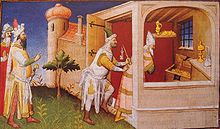Hülegü

Hülegü Chan , also Hülägü ( Mongolian ᠬᠦᠯᠡᠭᠦ Chülegü , Persian هولاکو خان; * at 1217 ; † February 8, 1265 ), was a Mongolian Khan and a grandson of Genghis Khan .
Life
His parents were Genghis Khan's son Tolui Khan († 1232) and the Nestorian Christian Sorkhatani Beki († 1252). Hülegü was the fifth son from this marriage. Little is known about his childhood and early years. In 1244 he married the Keraitic princess Doquz-Chatun (1229-1265). She was also a Christian, niece of the last Keraitenkhans Toghril Khan († 1203), who in the West was at times regarded as the bearer of the myth of the priest king John . On behalf of his brother Möngke (r. 1251–1259), Hülegü finally occupied Persia in 1256 , ended the rule of the assassins in the Elburs , conquered Baghdad and took over the administration there. Hülegü founded the Ilkhan Empire in Iran and Iraq , which lasted until 1353.
The Hülegü campaign went down in history because of its unusually cruel warfare, even for its time. For example, when his troops conquered Alamut , the castle of the assassins that was considered impregnable, in 1256 , the defenders were gutted after the surrender and the extensive library of scientific and medical works was burned.
The conquest of Baghdad on Feb. 10, 1258 marked the end of the 750-founded and once powerful Sunni Abbasids - Caliphate . When the city was sacked and destroyed, at least 250,000 residents were slain and the library of the House of Wisdom was thrown into the Tigris . The fighting in the area around Baghdad destroyed the irrigation systems and with the deaths of so many residents, the specialists for reconstruction were subsequently lacking. After the conquest of Baghdad, Hulegü occupied Syria , but withdrew his troops from there because of the unclear succession issue in Mongolia . The campaign therefore ended with a decisive defeat of his general Kitbukha against the Mamluks in 1260 in the battle of ʿAin Jālūt (Goliathsquell), north of Jerusalem.
In the following years Hülegü had to deal with his cousin Berke , the khan of the Golden Horde , with whom there were several points of contention (succession to the throne of Kubilais in Mongolia, Islam , trade and spoils of war, Caucasus border).
In 1263 Hülegü captured the city of Bukhara and killed several thousand people.
The Khan ruled independently in Maragha , even if he and his successors remained closely allied with the Great Khan or ruled in its name. In July 1264, Hülegü called a meeting (Kuriltai) in his field camp near Tabriz , at which his vassals King David VII of Georgia, King Hethum I of Armenia and Prince Bohemond VI. of Antioch were present. He set his own administrative officials (Finance Minister Sams ed Din Gowaini, court astrologer Nasir al-Din Tusi and others).
As a counterweight to the Mamluks and the Turks in Anatolia, Hülegü (and his successors) pursued an alliance policy with Byzantium and sought contact with the Christian states of Western Europe ( Louis IX ) and the Vatican. Pope Urban IV sent an embassy. To strengthen the relationship, he wanted to add a Byzantine princess to the number of his wives. Emperor Michael VIII sent his daughter Maria Despina Palaiologina with the Patriarch Euthymios. Hulegü had already died on arrival, but his son Abaqa took Maria as his wife.
Like his older brother Kublai Khan , Huegü was more educated than most of the Mongol princes. His court astrologer Nasir al-Din Tusi took advantage of his belief in astrology . When the Khan asked why horoscopes were so unreliable, he pointed out that the astronomical tables were several hundred years old. As a result, from 1259, Hülegü had the Rasad-e Khan observatory built on a hill above his residence in Maragha . The Zidsch-i Ilchani star map developed there still influenced the work of Nicolaus Copernicus . Hülegü's brother Kublai Khan had 27 solar observatories built in China for a calendar reform, with the Gaocheng observatory in Henan province still being preserved.
Hülegü died on February 8, 1265 in Maragha and was buried on a rocky island in Lake Urmia . Due to the influence of his widow Doquz-Chatuns, Abaqa and later his brother Tekuder Ahmed were his successors (see Ilchane ).
See also
literature
- Michael Prawdin : Mongol Empire. Its rise and legacy. Transaction, New Brunswick NJ 2006, ISBN 1-4128-0519-8 , pp. 288-379.
- Dilek Zaptcioglu: The History of Islam. Campus-Verlag, Frankfurt am Main et al. 2002, ISBN 3-593-37095-6 , pp. 142-143.
- Wilhelm Baum: HÜLÄGÜ. In: Biographisch-Bibliographisches Kirchenlexikon (BBKL). Volume 18, Bautz, Herzberg 2001, ISBN 3-88309-086-7 , Sp. 669-672.
Web links
- Hülegü . In: Ehsan Yarshater (Ed.): Encyclopædia Iranica (English, including references)
- Genealogy Hülegüs
Individual evidence
- ^ Jürgen Paul : Central Asia. S. Fischer, Frankfurt am Main 2012 (= Neue Fischer Weltgeschichte , Volume 10), ISBN 978-3-10-010840-1 , p. 290.
| predecessor | Office | successor |
|---|---|---|
| - |
Ilkhan of Persia 1256-1265 |
Abaqa |
| personal data | |
|---|---|
| SURNAME | Hülegü |
| ALTERNATIVE NAMES | Hulagu; Хүлэгү (Mongolian) |
| BRIEF DESCRIPTION | Mongolian prince and general, grandson of Genghis Khan |
| DATE OF BIRTH | around 1217 |
| DATE OF DEATH | February 8, 1265 |
| Place of death | Maragha (now Iran) |


